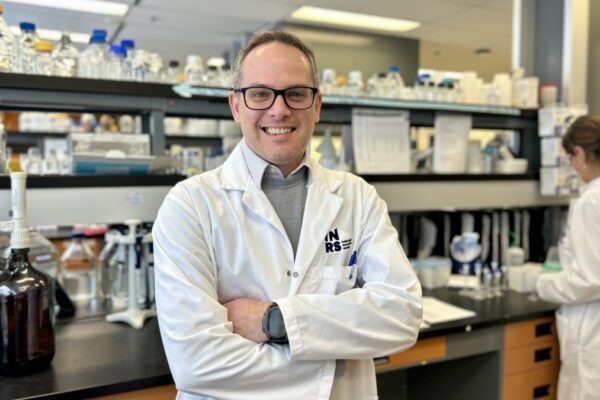- Awards and Distinctions
The student uses his expertise in data science and artificial intelligence, among others, to address the challenges of today and tomorrow.

Jérémie Boudreault, winner of the CIHR Health System Impact Program 2022
Doctoral student Jérémie Boudreault, who is conducting his research in Professor Fateh Chebana’s team at the Institut national de la recherche scientifique (INRS), has received a prestigious Canadian Institutes of Health Research (CIHR) Health System Impact Fellowship (HSIF). He is one of eighteen doctoral fellows in Canada to receive one. These annual fellowships bring emerging research and analytical talent to bear on pressing health system problems outside of traditional academia.
Boudreault will devote the next year to a project on the health impacts of extreme heat using artificial intelligence.
“I am an expert in data science and its practical applications in hydrometeorology. This project will allow me to expand my expertise in artificial intelligence and public health.”
Jérémie Boudreault
His multidisciplinary background has allowed him to combine studies in statistics and data science applied to the environment. After obtaining a bachelor’s degree in actuarial science, he completed a master’s degree in statistical hydrology at INRS before pursuing a doctorate. The environment as well as the issues that interest Boudreault are becoming more and more prominent in his career.
“Jérémie’s atypical background is an advantage in research. Since he has several areas of expertise, he impresses us with the paths he takes and the successes he achieves. A fellowship like this is a great recognition for an early-career researcher.”
Fateh Chebana, professor at the INRS Eau Terre Environnement Research Centre

Discover his background in the article :
Using AI to better understand the effects of extreme heat on health
The Ph.D. student is comparing different artificial intelligence (AI) approaches to model mortality and morbidity caused by extreme heat. When compared with the results of more traditional models, Boudreault’s results will improve understanding of the advantages and disadvantages of AI and validate commonly used approaches in the public health field.
This project will also grant new insight into the potentially complex interactions between heat and other meteorological and atmospheric variables such as humidity, wind, and air pollution.
Using AI to model the relationship between health and extreme heat has the potential to create a better understanding of that relationship and improve the anticipation of effects for prevention and monitoring purposes. More broadly, the results of Boudreault’s research will be used in his Ph.D. project as a basis for analyzing the health costs of extreme heat in the context of climate change.
“As climate change becomes a greater reality, I strongly believe that we need to address environmental issues affecting people’s health, including extreme heat events, using the latest and most advanced methods.”
Jérémie Boudreault
Driving expertise and training
As a student in the custom Ph.D. program in data science and environmental health, Jérémie will complete his one-year experiential learning opportunity, focused on integrated research, under the supervision of Associate Professor Céline Campagna, a specialized scientific advisor and institutional researcher in health and climate change at the Institut national de santé publique du Québec (INSPQ).
Because the results of this project address a concrete problem of interest, namely the impacts of heat and climate change on health, the INSPQ will be able to take advantage of them to influence public health decisions. They will also be used in the surveillance and prevention of various health impacts related to extreme heat, in line with the health monitoring thematic plan being developed at the INSPQ. Finally, they will help health authorities better prepare to limit the consequences of extreme heat.
The $50,000 HSIF is awarded by the CIHR to doctoral students and postdoctoral fellows. Early-career embedded researchers are eligible for a similar program. These individuals must be pursuing research in health services and policy or in a related field and completing an internship at a partner organization. The INSPQ will contribute $15,000 to this fellowship.
Jérémie Boudreault was also awarded the 2022 Réal Décoste scholarship from the Ouranos consortium. As a member of the Comité vert du 490 and head of environmental issues at AECETE, the Eau Terre Environnement Research Centre’s student association, he has spearheaded a waste management project within the research centre.
Congratulations, Jérémie Boudreault!



